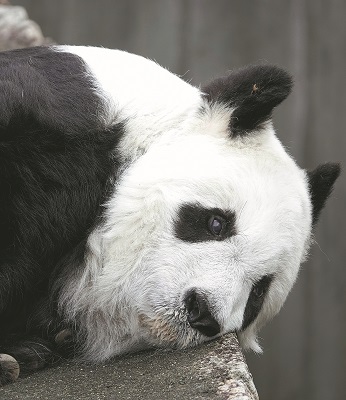Giant panda in Kobe zoo dies of heart disease


The giant panda Shuang Shuang, who was called Tan Tan in Japan and had been living in Kobe Oji Zoo since 2000, died due to heart disease on Sunday, according to an announcement from the China Wildlife Conservation Association.
Shuang Shuang, who was born in September 1995, suffered severe heart failure.
"Despite several days of rescue efforts by experts from China and Japan, her condition did not improve, and she passed away at 11:56 pm on Sunday," the announcement said.
Shuang Shuang was diagnosed with age-related heart disease during a routine checkup three years ago.
She arrived at Kobe Oji Zoo on July 16, 2000, as part of joint China-Japan conservation research efforts.
According to the cooperation agreement, Shuang Shuang was to return to China in July 2020. However, due to the COVID-19 pandemic, her return was postponed to the end of 2021.
"After the diagnosis of heart disease, experts from both China and Japan quickly organized a joint team for diagnosis and treatment, providing careful nursing care, which led to some degree of relief in Shuang Shuang's condition," the association said. "In order to stabilize her condition and aid her recovery, and considering the global pandemic, both China and Japan developed a rigorous treatment plan, leading to multiple postponements of Shuang Shuang's return to China, to avoid worsening her condition due to long-distance transportation."
Since May 2022, China had dispatched five groups of experts to provide continuous on-site guidance, consultations and treatment in Japan.
"Her arrival brought hope and joy to the Japanese people who had suffered from the Great Hanshin Earthquake in 1995. Additionally, she made a positive contribution to giant panda conservation research, technical exchange, public education and friendly relations between the two countries," the association said.
China and Japan will properly preserve Shuang Shuang's remains.
"After professional processing, the remains of Shuang Shuang will be returned to China at an appropriate time," it said.
According to experts from the China Conservation and Research Center for the Giant Panda, the average life span of captive giant pandas is around 25 to 30 years, while wild giant pandas have an average life span of 15 to 20 years. At 29 years old, the age of a giant panda is equivalent to that of a human nearing 100 years old.
"Typically, giant pandas are considered elderly after the age of 20.Similar to humans, common age-related diseases such as cataracts and hypertension are prevalent among elderly giant pandas, and as a type of cardiovascular disease, heart disease is also quite common," an expert said.
Giant pandas, a unique species native to China and classified as a first-class protected wildlife species, are often referred to as national treasures and are beloved by people around the world. Since the 1990s, China has collaborated on giant panda conservation with 26 institutions from 20 different countries.
The global captive population of giant pandas has reached 728 individuals, while the population of wild giant pandas in China has increased to nearly 1,900, according to the latest announcement from the National Forestry and Grassland Administration in January.
- Research ward at children's hospital in Shanghai treats over 200 patients with rare diseases
- Chongqing symposium examines planning cities around sound, smell, touch
- Former Qingdao legislature chief under investigation
- Former Xinjiang prosecutor Guo Lianshan under investigation
- Shandong and SCO discuss trade, investment and supply chain cooperation
- China courts see surge in maritime cases, foreign disputes





































